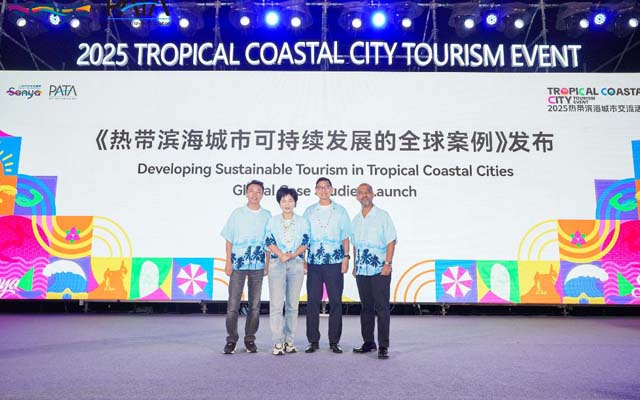PATA has released its Developing Sustainable Tourism in Tropical Coastal Cities: Global Case Studies report which outlines strategies for sustainable tourism development in tropical coastal destinations.
Launched on November 18 during the 2025 Tropical Coastal City Tourism Event in Sanya, the publication identifies four key pillars: resource management, harmony between locals and visitors, diversification of the economy and tourism products, and implementation of sustainable practices across the private sector.

The report examines challenges faced by coastal destinations and showcases successful case studies that balance economic growth, environmental conservation, and socio-cultural sustainability.
In Sanya, Wuzhizhou Island established Hainan’s first national-level marine ranch demonstration zone, restoring coral reefs and fishery resources while operating a comprehensive waste management system. The island was designated a “5A” tourist destination and recognised as a “Zero-Waste Tourism Attraction”.
Thailand’s initiatives focus on water resource management, including databases to monitor commercial and residential demand, water conservation campaigns, and fiscal measures to manage peak-season usage, while ecosystem restoration mitigates urban flooding.
Indonesia’s Desa Potato Head Resort in Bali achieved a 97.5 per cent recycling rate in 2023, is implementing solar energy, and has introduced technology to repurpose styrofoam into amenities.
The report is the 18th PATA publication released in 2025, complementing other research including the Annual Tourism Monitor, Halal Travel Trends, and Human Capital Development reports.
PATA CEO Noor Ahmad Hamid said: “Coastal areas, particularly in tropical regions, are among the most critically threatened by climate change. According to the World Meteorological Organisation, sea-surface temperatures in the South-West Pacific reached unprecedented levels in 2024, while ocean heat content was close to record highs. Other man-made threats – from careless actions to high volumes of visitors during peak seasons –are also putting severe pressure on the ecosystem.
“In the face of such challenges, PATA believes that collective progress must be driven by knowledge-sharing and coordinated action. These were the principles that underpin the creation of this report. We are honoured to share our findings and collected insights at the 2025 Tropical Coastal City Tourism Event to emphasise both the urgency of the issue and the power of collaboration.”
The report can be viewed here.

















